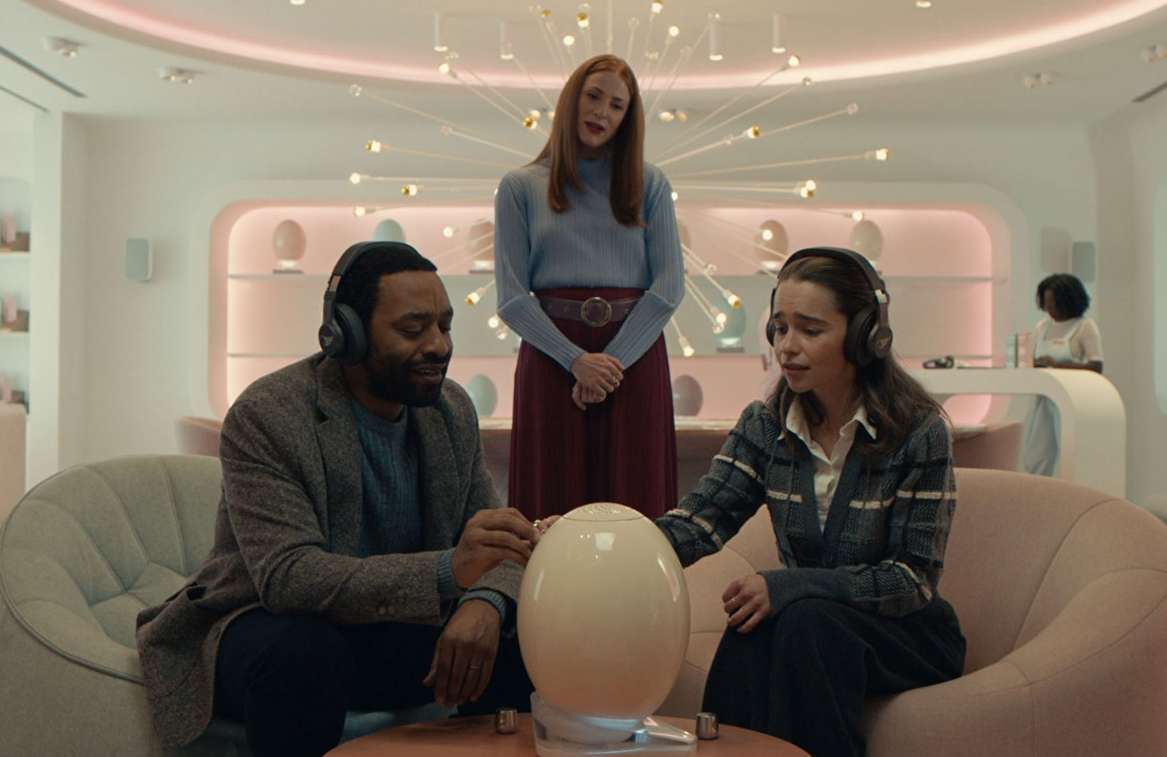“The Pod Generation” is a singular blend of science fiction, romance, and comedy in the world of cinematic narrative. This 2023 movie, written and directed by Sophie Barthes, gives audiences a look into a time when the fragile harmony between advanced technology and human emotions is the main focus. The film, which had its world premiere at the prestigious Sundance Film Festival in 2023, entices viewers with a provocative examination of love, relationships, and the impact of innovation on our lives.
The film follows Rachel and Alvy (Chiwetel Ejiofor) as they consider the possibility of using a detachable AI-controlled womb to have a kid. While the movie has an intriguing premise and hints of excitement, its emotional effect is lacking, and a surprising change in tone near the end leaves viewers with conflicted emotions.
What took place in the film?
“The Pod Generation” introduces us to Rachel (Emilia Clarke), a diligent professional at the cutting edge of technology, and is set in New York City in the near future. In dramatic contrast to her reality, Rachel has a dream early in the movie where she sees herself pregnant. The idea of conventional birthing seems onerous and impracticable in today’s technologically advanced society when AI-driven comforts rule daily life.
When her employer, the computer firm Pegazus, promises to support her during the unusual delivery procedure offered by the Womb Center, Rachel’s life takes an unexpected turn. This ground-breaking facility provides a removable artificial womb that enables human embryos to develop outside of the normal womb. Alvy, Rachel’s spouse, has opposing views to Rachel’s, placing value on a connection to nature and disliking the overuse of technology.
The Womb Center: Linking Parenthood and Science
The mysterious creature known as the Womb Center sits at the center of the movie. The Pegazus-owned Womb Center, a ground-breaking research center, serves as a ray of hope for couples trying to conceive in a world where birth rates are falling. This state-of-the-art institution uses technology to create artificial wombs that can be detached, opening up a new route to parenting. Couples can raise embryos to term in the Center’s cutting-edge pods by simulating the conditions of a natural womb.
The Transformational Journey of Alvy
Alvy, a botanist who values being in touch with nature, is first opposed to the idea of using technology during childbirth. His morals are based on a desire to maintain the natural order, hence the concept of detachable artificial wombs offends him. Alvy’s attitude does change during the course of his unique trip with Rachel, though. Alvy learns to see the pod as more than just a piece of technology and starts to suffer emotional upheaval along the way.
The couple’s relationship with the pod strengthens as the plot progresses, reflecting the challenges of contemporary fatherhood. Although initially excited about the detachable womb’s possibilities, Rachel encounters unexpected difficulties that alienate her from the procedure. Alvy’s developing attachment to the pod, which causes him to change from a skeptic to a protective guardian, blurs the lines between nature and technology.
In its affecting conclusion, “The Pod Generation” shifts from its science fiction origins to a story of love and connection. The movie highlights how technology has the capacity to change how we view interpersonal relationships through the struggles and decisions that Rachel and Alvy encounter. Audiences are left wondering how to strike a balance between innovation and the truth of human experiences thanks to Sophie Barthes‘ visionary direction, which expertly portrays the synthesis of these subjects.
“The Pod Generation” presents a commentary on the delicate dance between development and tradition in a world where technological advancements continue to reshape our lives. The movie serves as a reminder that, despite technological advancements, the essential ties of love and family remain constants that stand the test of time and progress.
